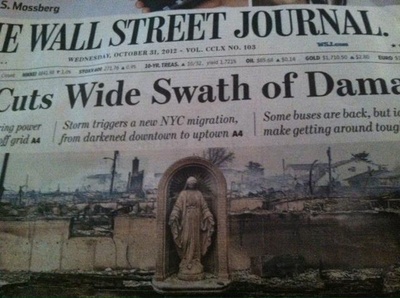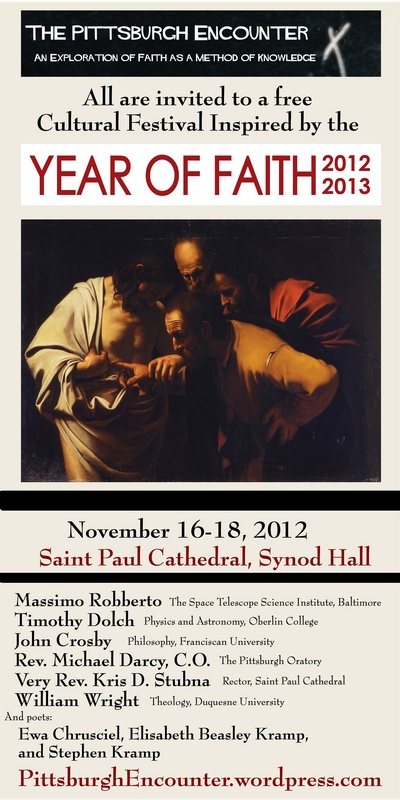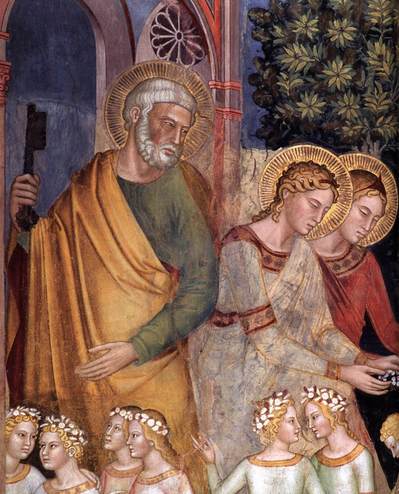Paul Zalonski: October 2012 Archives
My dear brother priests, the sacraments are not to be celebrated in exchange for money. The trafficking for money in spiritual things is simony. It is a sin.
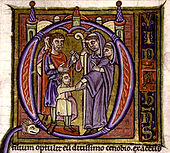
 An ad on the back cover of the Catholic New York sparks me to draw the attention of Communio readers and others to the good work of The Gianna Center and the founders, Dr. Anne Nolte and Dr. Kyle Beiter.
An ad on the back cover of the Catholic New York sparks me to draw the attention of Communio readers and others to the good work of The Gianna Center and the founders, Dr. Anne Nolte and Dr. Kyle Beiter.A friend of mine, a Melkite priest, in fact, alerted his friends that a cousin of his in Aleppo was abducted by terrorists and days later released. A tense time no doubt. We are grateful to the Lord the young man's return.
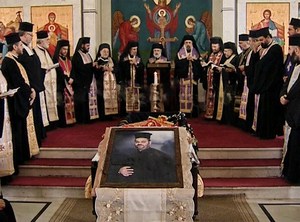
Of concern, too, is the assassination of a Greek Orthodox priest near Damascus. Father Fadi Jamil Haddad, 43, pastor of St. Elias Church in Qatana, outside Damascus, found slain on October 26, shot in head, in the Jaramana district of the capital. Vatican news people report that an "unidentified armed group" was responsible. $715,000 was demanded. Further details are really unclear.
Of the Christian minority in Syria, the Greek Orthodox is known as the largest; Christians represent perhaps 10% of the population. Make no mistake, Christians have long been resident in Syria now a majority Muslim.
An Orthodox friend of mine posted this prayer and icon in light of the weather storm Sandy coming our way, and I am reposting. State government predictions are sounding exaggerated right now, but one can really tell. In Connecticut, along the waterfront, it is predicted that four high tide cycles will be exceptional, and rough weather--high winds and rain-- over 36-48 hours. In category four areas more than 362 thousand people expect some inconvenience. Let's not tempt fate. In charity, let's pray to the Divine Master, "A Prayer at the Threat from Malevolent Winds and Sea Storms."
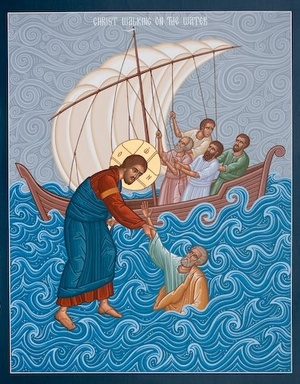
O Master, Lord our God, Who by Thy Consubstantial and Un-originate Word, and Thy Life-Giving Spirit Who is equal in honor, hast brought all things out of nothingness into being; Who hast established the sand as bounds to the sea, and weighed the mountains and the valleys in a balance; Who hast measured the skies and holdest the water in the palm of Thy hand; Who hast given to this visible world of the senses its laws and rules, its harmony and order; Who hast appointed changes to the weather and variations in the orbit of the sun; Who, through the mingling of the elements, holdest all things together by Thine inexpressible power, and keepest them free from harm and intact: Do Thou Thyself, O All-Good King, extending to us Thine innate and customary love and goodness, visit the work of Thy hands. Do not deprive us of Thy mercies and Thy compassion, and do not destroy Thine inheritance, for Thou hast ineffably created us in Thine own image.
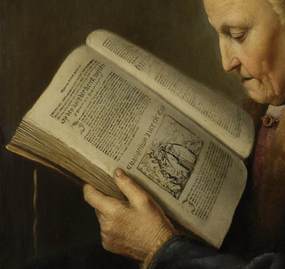
The Pope's homily at the close of the Synod of Bishops on the New Evangelization.
The miracle of the healing of blind Bartimaeus comes at a significant point in the structure of Saint Mark's Gospel. It is situated at the end of the section on the "journey to Jerusalem", that is, Jesus' last pilgrimage to the Holy City, for the Passover, in which he knows that his passion, death and resurrection await him. In order to ascend to Jerusalem from the Jordan valley, Jesus passes through Jericho, and the meeting with Bartimaeus occurs as he leaves the city - in the evangelist's words, "as he was leaving Jericho with his disciples and a great multitude" (10:46). This is the multitude that soon afterwards would acclaim Jesus as Messiah on his entry into Jerusalem. Sitting and begging by the side of the road was Bartimaeus, whose name means "son of Timaeus", as the evangelist tells us. The whole of Mark's Gospel is a journey of faith, which develops gradually under Jesus' tutelage. The disciples are the first actors on this journey of discovery, but there are also other characters who play an important role, and Bartimaeus is one of them. His is the last miraculous healing that Jesus performs before his passion, and it is no accident that it should be that of a blind person, someone whose eyes have lost the light. We know from other texts too that the state of blindness has great significance in the Gospels. It represents man who needs God's light, the light of faith, if he is to know reality truly and to walk the path of life. It is essential to acknowledge one's blindness, one's need for this light, otherwise one could remain blind for ever (cf. Jn 9:39-41).
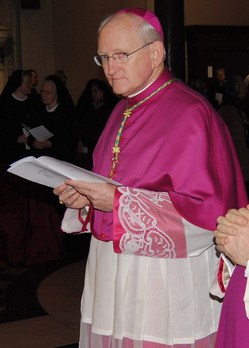
In a surprise given to the Church this morning, Pope Benedict announced his intention to name new cardinals in November. One of them is an American, Archbishop James Michael Harvey of Milwaukee who has been serving at the Apostolic Household as its Prefect for the last several years. These new cardinals lifts the numbers eligible to vote in a conclave to 122.
In announcing the intention to create new cardinals, the Pope said: "The Cardinals have the task of helping the Successor of Peter in the performance of his ministry of confirming the brethren in the faith, and that of being the principle and foundation of unity and communion of the Church ... fulfill their ministry in the service of the Holy See or as fathers and pastors of particular Churches in various parts of the world."
The proposed list of new cardinals are
- Archbishop James Michael Harvey, 63, Prefect of the Pontifical House, who is also appointed Archpriest of the Basilica of Saint Paul outside the Walls,
- His Beatitude Béchara Boutros Raï, 72, Patriarch of Antioch of the Maronites (Lebanon),
- His Beatitude Baselios Cleemis Thottunkal, 53, Major Archbishop of Trivandrum of the Syro- Malankara (India),
- Archbishop John Olorunfemi Onaiyekan, 68, Archbishop of Abuja (Nigeria),
- Archbishop Ruben Salazar Gómez, 70, Archbishop of Bogota (Colombia),
- Archbishop Luis Antonio Tagle, 55, Archbishop of Manila (Philippines).
The
consistory will take place on November 24.
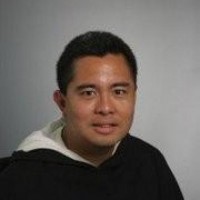
The Rhode Island Benedictine Portsmouth Abbey School welcomed Dominican Father Nicanor Austriaco to deliver the Dom Luke Childs Lecture on October 15, 2012. He is an Associate Professor of Biology at Providence College. Father's address was titled, "What Can Human Genomics Tell Us About Adam and Eve?"
Watch the presentation, it is very good and informative.
The Dom Luke Childs Lecture honors the popular Benedictine monk who taught at Portsmouth and died unexpectedly in 1976. The Lecture topics cover a wide range of intellectual and culture pursuits.
As the 2012 elections draw near, we are all encouraged to evaluate where we stand and where we're heading as a country, since we all belong to one nation that has a common good. Particularly in this moment, when so many of our fellow countrymen suffer from unemployment and economic distress, we know that many long for improvement in their lives. All the same, we don't believe this election will magically solve the gravest problems that America faces. Legislation, policies, and programs--no matter how perfect--depend on the freedom of flawed human beings like us.
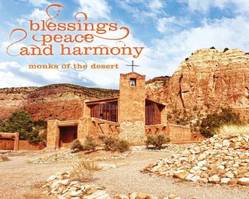 Last week (17 October 2012) six monks from two monasteries, The Abbey of Christ in the Desert (NM) and and Mount Saviour Monastery(NY) met in NYC to have their 3 minutes of fame on the Today Show.
Last week (17 October 2012) six monks from two monasteries, The Abbey of Christ in the Desert (NM) and and Mount Saviour Monastery(NY) met in NYC to have their 3 minutes of fame on the Today Show.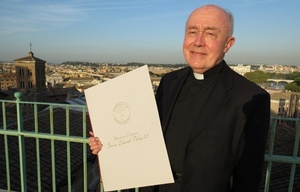 The Ratzinger Prize is getting a whole currency these days: it is the second year that's been bestowed on worthy scholars. What's novel of me is that it's not everyday that you get a prize for serious work from the man the prize is named after, and that he's the Supreme Pontiff! The 2012 Ratzinger Prize was given to a French philosopher and American theologian on Saturday, October 20, 2012. Pope Benedict said that "Father Daley and Professor Brague are exemplary for the transmission of knowledge that unites science and wisdom, scientific rigor and passion for man, so that man might discover the [true] 'art of living.'" Chris Altieri has the Vatican Radio report here.
The Ratzinger Prize is getting a whole currency these days: it is the second year that's been bestowed on worthy scholars. What's novel of me is that it's not everyday that you get a prize for serious work from the man the prize is named after, and that he's the Supreme Pontiff! The 2012 Ratzinger Prize was given to a French philosopher and American theologian on Saturday, October 20, 2012. Pope Benedict said that "Father Daley and Professor Brague are exemplary for the transmission of knowledge that unites science and wisdom, scientific rigor and passion for man, so that man might discover the [true] 'art of living.'" Chris Altieri has the Vatican Radio report here.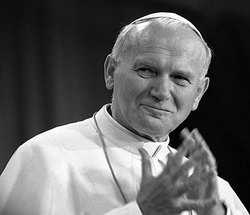 The Holy See has approved today as the liturgical memorial for Blessed Pope John Paul II. The opening collect, below, is the only prayer for the memorial and it does not appear in the Roman Missal.
The Holy See has approved today as the liturgical memorial for Blessed Pope John Paul II. The opening collect, below, is the only prayer for the memorial and it does not appear in the Roman Missal.Those who hold the rank of Ordinary members of the Synod Bishops are able to make a public contribution at the Synod. On Saturday, October 13, 2012, the President of the Fraternity of Communion and Liberation, Father Julián Carrón, made his presentation to the assembled Synod members, and the Pope. Pay close attention to exactly what Father Carrón said,
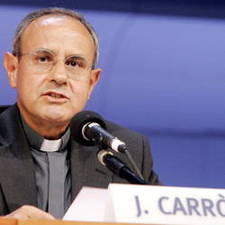
We can no longer "think of the faith as a self-evident presupposition for life in society". In fact, "not only can this presupposition no longer be taken for granted, but it is often openly denied" (Porta Fidei, 2).
While reading the Instrumentum laboris (142), I was shocked by this observation: "a concern on the scarcity of initial proclamation taking place everyday". All the efforts made until today are having trouble generating newness of life that will arouse curiosity on how the baptized live. How can the fracture between faith and life be overcome, a fracture that makes it harder for faith to be found in a reasonable way, and therefore, attractive? Without rediscovering and welcoming the precious gift that is faith, new evangelization risks being diminished to being a question for experts.
To incite this interest, we have an ally in the heart of man from any culture and condition. We know that the heart of man is made for the infinite. Awaiting its achievement remains in him. Because there is "no false infinite that can satisfy him". "What, then, will anyone gain by winning the whole world and forfeiting his life?" (Mt 16:26).
A
doctrine, a group of rules, an organization cannot answer this expectation,
only an event. As Fr. Giussani said during the 1987 Synod, "What is lacking
is not as much the verbal or cultural repetition of the proclamation. Today's
man perhaps awaits subconsciously the experience of the encounter with persons
for whom the fact of Christ is such a present reality that it has changed their
lives". A place where everyone is invited to verify what the first
verified on the banks of the river Jordan: "Come and see", because
"a faith that cannot be evidentiated and found in present experience,
confirmed by it, that is not useful in answering its needs, will not be a faith
capable of resisting in a world where everything, absolutely everything, says
the opposite".
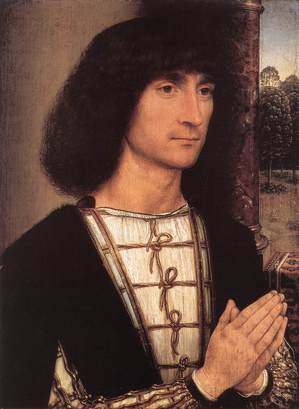 Today's gospel is the familiar narrative of the Rich Young Man: "go and sell follow me." It is clear in Saint Mark's rendering of the story that the young man is good. He does good things, he does what any respectable person would want to do; the young man asks the right questions; he follows what the tradition lays before him. So, the man actually is admirable according to the measure of this world. But the measure with which a person of faith judges is very different because it is a given, and not achieved. There is one that the young man's not able to grasp: the greatness offered to him by God. He lacks the capacity to accept that it is not about the human will in attaining lasting happiness. As we know, it's only the Infinite that suffices in answering the needs of the human heart. As the psalm indicates, filled with Love, we sing for joy. The eschatological hope we live in is one mercy's face is more beautiful than any of the temporal riches we can conceive of. Jesus offers the young man the possibility of greatness and not mere goodness; the Lord shows him the path to eternal life, not just the best way to get through the city; God hands him holiness and not the safety of existence.
Today's gospel is the familiar narrative of the Rich Young Man: "go and sell follow me." It is clear in Saint Mark's rendering of the story that the young man is good. He does good things, he does what any respectable person would want to do; the young man asks the right questions; he follows what the tradition lays before him. So, the man actually is admirable according to the measure of this world. But the measure with which a person of faith judges is very different because it is a given, and not achieved. There is one that the young man's not able to grasp: the greatness offered to him by God. He lacks the capacity to accept that it is not about the human will in attaining lasting happiness. As we know, it's only the Infinite that suffices in answering the needs of the human heart. As the psalm indicates, filled with Love, we sing for joy. The eschatological hope we live in is one mercy's face is more beautiful than any of the temporal riches we can conceive of. Jesus offers the young man the possibility of greatness and not mere goodness; the Lord shows him the path to eternal life, not just the best way to get through the city; God hands him holiness and not the safety of existence.I think one of the witnesses of Jesus Christ that we need to follow is Archbishop Charles J. Chaput, archbishop of Philadelphia. The archbishop writes a weekly column and it's usually quite good and very worthy of reflection. Today's installment is no less worthy at the start of the Year of Faith. Entitled, "The Year of Faith and how we're called to it" is noted here, but three of the paragraphs are excerpted below. When you read the article play close attention to the quote of Henri de Lubac!
Real faith - the kind our Holy Father calls us to -- demands a keen awareness of our failures as Christians and a spirit of repentance. It requires us to seek out who Jesus Christ really is, and what he asks from each of us as disciples. And that always involves the cross.
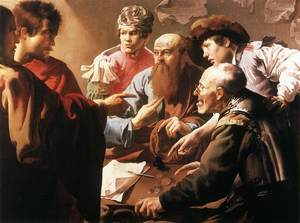 Last Sunday many of the communities of Communion and Liberation around the USA met for a "Beginning Day". We met in NYC to hear the national leader of CL, Chris Bacich, make a presentation, to listen to Father Julián Carrón's presentation and to pray the Mass. About 100 CL in NY attended. Notes on the Day later. But in the meantime, expect a journey, not a miracle; journey in faith is made in experience of what Jesus gives us to live.
Last Sunday many of the communities of Communion and Liberation around the USA met for a "Beginning Day". We met in NYC to hear the national leader of CL, Chris Bacich, make a presentation, to listen to Father Julián Carrón's presentation and to pray the Mass. About 100 CL in NY attended. Notes on the Day later. But in the meantime, expect a journey, not a miracle; journey in faith is made in experience of what Jesus gives us to live.You can always count on Francis Cardinal George, OMI, to speak the truth. He is always very clear, always on target when looking at the American cultural situation. On September 30, 2012, he celebrate a votive Mass of the Holy Spirit and delivered a homily for the annual Red Mass, at which he said, "There are times the law is a a cause of scandal." The following paragraphs give a sense of what the Cardinal said. The rest of the homily may be read here.
What is left now to our common life is whatever a legislative majority or the often-manipulated whims of popular majority opinion will tolerate. That is no longer a classical Constitutional legal order. The law has betrayed its own vocation.
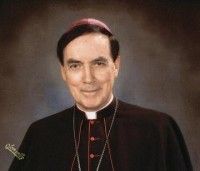 Today, as you know the Church begins a Year of Faith. We also observe today the 50th anniversary of the Second Vatican Council. Not least in the list of initiatives is the inauguration of a blog written by Archbishop Henry J. Mansell, the archbishop of Hartford.
Today, as you know the Church begins a Year of Faith. We also observe today the 50th anniversary of the Second Vatican Council. Not least in the list of initiatives is the inauguration of a blog written by Archbishop Henry J. Mansell, the archbishop of Hartford. 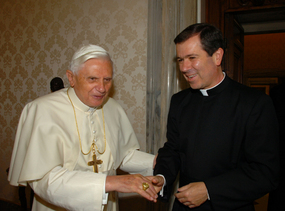 In a letter dated October 9, 2012 and released to the public today, (see below) to the priests and brothers of the Legion of Christ, the Regnum Christi Movement and the faithful who follow the Legion, Father Alvaro Corcuera, 55, has announced he is stepping aside as General Director. Health concerns are cited. All this in favor of handing governance to the Vicar of the congregation, Father Sylvester Heereman, 38, until the next General Chapter meets in late 2013 or early 2014.
In a letter dated October 9, 2012 and released to the public today, (see below) to the priests and brothers of the Legion of Christ, the Regnum Christi Movement and the faithful who follow the Legion, Father Alvaro Corcuera, 55, has announced he is stepping aside as General Director. Health concerns are cited. All this in favor of handing governance to the Vicar of the congregation, Father Sylvester Heereman, 38, until the next General Chapter meets in late 2013 or early 2014.In the presence of hundreds of bishops, the Eastern Catholic Patriarchs, ecumenical partners and laity, Pope Benedict prayed the Mass and preached on the meaning of both the Second Vatican Council and the Year of Faith through the lens of conversion. Benedict is clear: the Year of Faith is not celebrating the 50th anniversary of the Second Vatican Council. The Church needs not a special forum for this anniversary; it is all an invitation to conversion and to deepen one's faith in the Christ. The homily Pope Benedict delivered today follows.
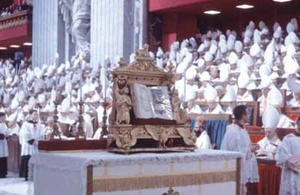
Today, fifty years from the opening of the Second Vatican Ecumenical Council, we begin with great joy the Year of Faith. I am delighted to greet all of you, particularly His Holiness Bartholomaois I, Patriarch of Constantinople, and His Grace Rowan Williams, Archbishop of Canterbury. A special greeting goes to the Patriarchs and Major Archbishops of the Eastern Catholic Churches, and to the Presidents of the Bishops' Conferences. In order to evoke the Council, which some present had the grace to experience for themselves - and I greet them with particular affection - this celebration has been enriched by several special signs: the opening procession, intended to recall the memorable one of the Council Fathers when they entered this Basilica; the enthronement of a copy of the Book of the Gospels used at the Council; the consignment of the seven final Messages of the Council, and of the Catechism of the Catholic Church, which I will do before the final blessing. These signs help us not only to remember, they also offer us the possibility of going beyond commemorating. They invite us to enter more deeply into the spiritual movement which characterized Vatican II, to make it ours and to develop it according to its true meaning. And its true meaning was and remains faith in Christ, the apostolic faith, animated by the inner desire to communicate Christ to individuals and all people, in the Church's pilgrimage along the pathways of history.
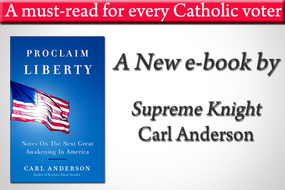 Carl Anderson, Supreme
Knight of the Knights of Columbus, published Proclaim Liberty: Notes on the
Next Great Awakening in America.
Carl Anderson, Supreme
Knight of the Knights of Columbus, published Proclaim Liberty: Notes on the
Next Great Awakening in America.
Anderson's "eBook shows how Catholics -- by voting in a manner consistent with Catholic social teaching -- can transcend our broken politics and excessive partisanship. It lays out a roadmap to truly transforming our country." Moreover, Proclaim Liberty brings together "the issues confronting us in political races and ballot initiatives large and small into focus, using the lens of Catholic social teaching."
Carl Anderson's new work complements the US bishops' document Forming Consciences for Faithful Citizenship, in which they call "Catholics to form their consciences in the light of their Catholic faith and to bring our moral principles to the debate and decisions about candidates and issues."
More information, as well as links
to eBook sellers, is available here.

The Portsmouth Institute is delighted to announce that the 2013 Institute will take place June 7-9 on the topic of CATHOLICISM AND THE AMERICAN EXPERIENCE. The keynote speaker on June 7th will be George Weigel, author of many books on Catholicism, papal biographer, and senior fellow of the Ethics and Public Policy Center in Washington DC.
Stay tuned for further details on speakers and events of next June's Institute; call or write Cindy Waterman at cwaterman@portsmouthabbey.org or 401.643.1244.
 The month of October is devoted to the theme of Our Lady of the Holy Rosary. The Rosary is the official prayer for the Year of Faith. As Pope Benedict recently said, "I would like to suggest to everyone to renew the prayer of the Rosary in the upcoming Year of Faith. With the Rosary, we allow ourselves to be guided by Mary, model of faith, in meditating on the mysteries of Christ."
The month of October is devoted to the theme of Our Lady of the Holy Rosary. The Rosary is the official prayer for the Year of Faith. As Pope Benedict recently said, "I would like to suggest to everyone to renew the prayer of the Rosary in the upcoming Year of Faith. With the Rosary, we allow ourselves to be guided by Mary, model of faith, in meditating on the mysteries of Christ."- the address of God: "Almighty and ever-living"
- the "ut clause": "who in the abundance of your kindness surpass the merits and the desires of those who entreat you"
- the petition: "pour out your mercy upon us to pardon what conscience dreads and to give what prayer does not dare to ask"
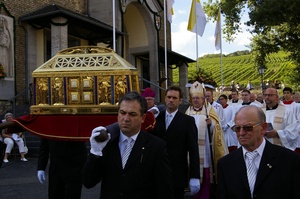 Today, the Holy Father proclaimed two new Doctors of the Church, the highest honor for saints because of their exemplary lives and insightful doctrine.
Today, the Holy Father proclaimed two new Doctors of the Church, the highest honor for saints because of their exemplary lives and insightful doctrine.This morning in Rome, Pope Benedict opened the 13th Ordinary Synod of Bishops whose it will be to guide him and the entire Church, in the work of Evangelization. At Holy Mass, His Holiness bestowed the honor of being Doctors of the Church on Saint John of Avila and Saint Hildegard of Bingen. The Pope's homily follows.
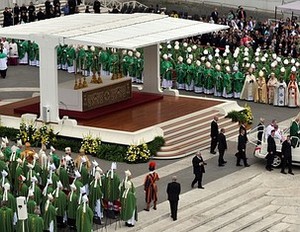
With this solemn concelebration we open the thirteenth Ordinary General Assembly of the Synod of Bishops on the theme The New Evangelization for the Transmission of the Christian Faith. This theme reflects a programmatic direction for the life of the Church, its members, families, its communities and institutions. And this outline is reinforced by the fact that it coincides with the beginning of the Year of Faith, starting on 11 October, on the fiftieth anniversary of the opening of the Second Vatican Ecumenical Council. I give a cordial and grateful welcome to you who have come to be part of the Synodal Assembly, in particular to the Secretary-General of the Synod of Bishops, and to his colleagues. I salute the fraternal delegates of the other churches and ecclesial communities as well as all present, inviting them to accompany in daily prayer the deliberations which will take place over the next three weeks.
The readings for this Sunday's Liturgy of the Word propose to us two principal points of reflection: the first on matrimony, which I will touch shortly; and the second on Jesus Christ, which I will discuss now. We do not have time to comment upon the passage from the Letter to the Hebrews but, at the beginning of this Synodal Assembly, we ought to welcome the invitation to fix our gaze upon the Lord Jesus, "crowned with glory and honour, because of the suffering of death (2:9). The word of God places us before the glorious One who was crucified, so that our whole lives, and in particular the commitment of this Synodal session, will take place in the sight of him and in the light of his mystery. In every time and place, evangelization always has as its starting and finishing points Jesus Christ, the Son of God (cf. Mk 1:1); and the Crucifix is the supremely distinctive sign of him who announces the Gospel: a sign of love and peace, a call to conversion and reconciliation. My dear Brother Bishops, starting with ourselves, let us fix our gaze upon him and let us be purified by his grace.
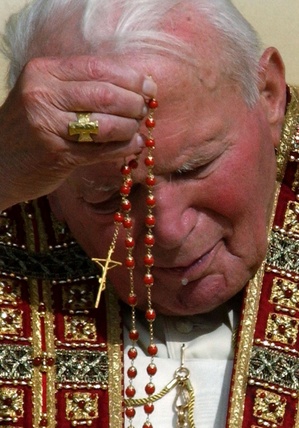
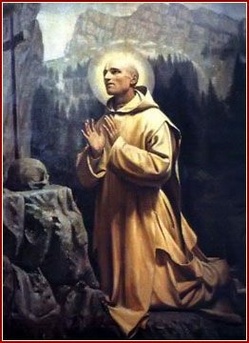 O God, who called Saint Bruno to serve you in
solitude, grant, through his intercession that amid the changes of this world
we may constantly look to you alone.
O God, who called Saint Bruno to serve you in
solitude, grant, through his intercession that amid the changes of this world
we may constantly look to you alone.
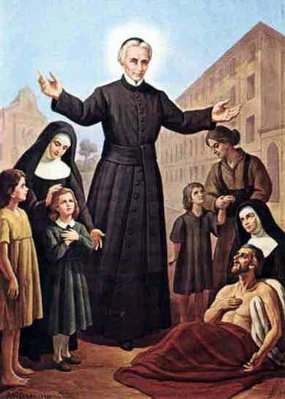
- the grace of being a Good Shepherd for the newly ordained bishop of the Diocese of Iverea (Italy), the Most Reverend Edoardo Aldo Cerrato; until recently he was the Procurtaor General of the Oratorians;
- the grace of being the Good Shepherd for the newly elected Procurator General of the Oratorians, Father Mario Avilés, CO; until recently, Father Mario has been the director of the Oratorian Schools in Pharr, Texas.
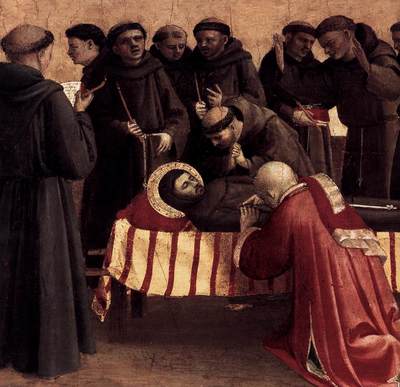
Just about a week ago did Mother Placid Dempsey, nun of the Abbey of Regina Laudis, make her way to the Lord. Her final act of earthly love to the One whom she committed herself to in this life, and lived in communio with for 85 years, accepted the invitation of the Lord for life eternal. Mother Placid was the first Benedictine nun of Regina Laudis that I met; we were introduced by a mutual friend, Palma. And boy was she helpful in a time of my life that needed reassurance.
It's amazing to read all the things one does in life when one dies; her obit shines but a little light on a person many only aspire to be. Mother Placid was a unique woman of faith. I am grateful for the times we've met in her lucid years. Her diminishment was hard to watch. The last time I saw her in person a few years ago following Mass it was as though we met for the first time. The illness bore her mind away but her smile was all I needed. I think it was she behind the grill at the abbey church that walked with help in and out choir. I offered my prayer for Mother.
Someone characterized Mother Placid perfectly: "Wise, impish, witty, given to sharp spiritual insights and equally pointed...." All of which was true to my experience and for which I am grateful.
With the Church, let us pray,
Grant, we pray, almighty God, that the soul of your servant Mother Placid, who for love of Christ walked the way of perfect charity, may rejoice in the coming of your glory and together with her sisters may delight in the everlasting happiness of your Kingdom.
The obit posted by the Abbey follows.
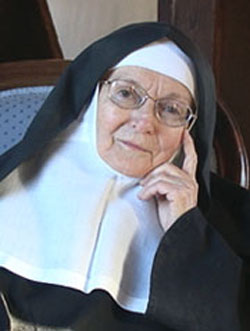
Reverend Mother Placid (Patricia Ann) Dempsey, 85, consecrated nun of the Abbey of Regina Laudis, died September 27, 2012 at the Abbey after a long illness. Described as a tiny giant, Mother Placid--artist, poet, and guest mistress for over 50 years--touched the lives of thousands of people.
Patricia Ann Dempsey was the youngest of four children of William Ambrose Dempsey, New York City trial lawyer, and Kathleen Costello Dempsey, teacher and housewife. The Dempseys migrated to America at the time of the great famine in Ireland and settled in Pennsylvania where Mother Placid's grandmother ran a saloon in the mountain mining town of White Haven. The Costellos were metal craftsmen for centuries in Ireland. Her maternal grandfather was instrumental in bringing the Knights of Columbus to Brooklyn.
Patricia grew up in Brooklyn, and described the atmosphere of her home as "...warm and intellectually stimulating with discussions of cultural matters, philosophical questions, and legal matters". After graduating from St. Angela Hall Academy High School, she received her Bachelor's Degree in Art from Marymount College (Tarrytown NY) in 1949. In both high school and college she was awarded honors for her art. She was active in all aspects of drama, especially scenery design and construction. She also participated in many cultural and charitable activities, including social activities for the blind, infirm and pre-school children.
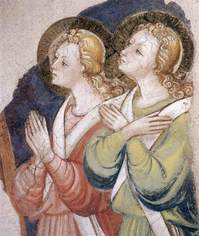 Since today is the feast of the Guardian Angels there are some in the secular world, especially on TV, who are speaking on the feast trying to give an aire of respectability to an already firmly established belief in the existence of the Guardian Angels. However, so much in the public forum forget key points in Catholic teaching: the angels look, in glory, upon God's face and sent by Him to man and woman in manner that is unseen by man. Angels help us, and are in pure contemplation of God; they obey God's holy and uncontestable will.
Since today is the feast of the Guardian Angels there are some in the secular world, especially on TV, who are speaking on the feast trying to give an aire of respectability to an already firmly established belief in the existence of the Guardian Angels. However, so much in the public forum forget key points in Catholic teaching: the angels look, in glory, upon God's face and sent by Him to man and woman in manner that is unseen by man. Angels help us, and are in pure contemplation of God; they obey God's holy and uncontestable will.Recently I was reading some blog written by a Catholic extolling the virtues of a Melkite parish near to where she lives. Hurray! This woman found peace in the Byzantine East, and Melkite no less. What right-thinking Catholic would dismiss Eastern Christianity? All the things this blogger noted from icons, to incense, to singing the Liturgy, and the priest facing East are good and beautiful things but the essential was missing. No mention of Jesus Christ and the personal encounter needed for the attainment of one's Destiny. One can only say to her list of likes: so what!
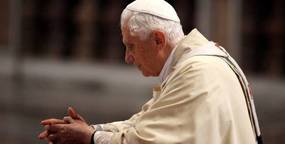
At the foot of the Cross, and with the help of Saint Thérèse, we ask for the following with Pope Benedict:
The general intention
That the New Evangelization may progress in the oldest Christian countries.
The mission intention
That the celebration of
World Mission Day may result in a renewed commitment to evangelization.
Also, may I recommend to our daily prayers the work the Church is about to embark on, that is the Synod of Bishops on the New Evangelization and those who are dealing with addiction (I have a family member who is trying to kick her addictions to the curb, but is facing her own opposition.)
Saints Joseph and Thérèse, pray for us.
